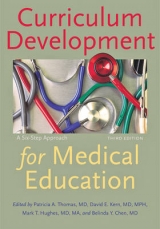
Curriculum Development for Medical Education
A Six-step Approach
Seiten
2009
|
2nd Revised edition
Johns Hopkins University Press (Verlag)
978-0-8018-9367-4 (ISBN)
Johns Hopkins University Press (Verlag)
978-0-8018-9367-4 (ISBN)
- Titel erscheint in neuer Auflage
- Artikel merken
Zu diesem Artikel existiert eine Nachauflage
Suitable for curriculum developers, this book includes a broad discussion of competencies mandated by the Accreditation Council for Graduate Medical Education and other bodies, information on education technology, increased emphasis on scholarships related to curriculum development, and advice on obtaining Institutional Review Board approval.
Curriculum Development for Medical Education is designed for use by curriculum developers and others who are responsible for the educational experiences of medical students, residents, fellows, and clinical practitioners. Short, practical, and general in its approach, the book begins with a broad overview of the subject. Each succeeding chapter covers one of the six steps: problem identification and general needs assessment, targeted needs assessment, goals and objectives, educational strategies, implementation, and evaluation. Additional chapters address curriculum maintenance, enhancement, and dissemination. The six-step approach outlined here has evolved over the past twenty years, during which time the authors have taught curriculum development and evaluation skills to faculty and fellows in the Johns Hopkins University Faculty Development Program for Clinician-Educators.
Program participants have used the techniques described to develop curricula on such diverse topics as preclerkship skills building, clinical reasoning and shared decision making, outpatient internal medicine, musculoskeletal disorders, office gynecology for the generalist, chronic illness and disability, geriatrics for nongeriatric faculty, surgical skills assessment, laparoscopic surgical skills, cross-cultural competence, and medical ethics. This thoroughly revised edition includes a broad discussion of competencies mandated by the Accreditation Council for Graduate Medical Education and other bodies, current information on education technology, increased emphasis on scholarships related to curriculum development, and advice on obtaining institutional review board approval. Updated examples throughout the book illustrate major points. The expanded appendixes include samples of complete curricula and information on funding, faculty development, and curricular resources.
Curriculum Development for Medical Education is designed for use by curriculum developers and others who are responsible for the educational experiences of medical students, residents, fellows, and clinical practitioners. Short, practical, and general in its approach, the book begins with a broad overview of the subject. Each succeeding chapter covers one of the six steps: problem identification and general needs assessment, targeted needs assessment, goals and objectives, educational strategies, implementation, and evaluation. Additional chapters address curriculum maintenance, enhancement, and dissemination. The six-step approach outlined here has evolved over the past twenty years, during which time the authors have taught curriculum development and evaluation skills to faculty and fellows in the Johns Hopkins University Faculty Development Program for Clinician-Educators.
Program participants have used the techniques described to develop curricula on such diverse topics as preclerkship skills building, clinical reasoning and shared decision making, outpatient internal medicine, musculoskeletal disorders, office gynecology for the generalist, chronic illness and disability, geriatrics for nongeriatric faculty, surgical skills assessment, laparoscopic surgical skills, cross-cultural competence, and medical ethics. This thoroughly revised edition includes a broad discussion of competencies mandated by the Accreditation Council for Graduate Medical Education and other bodies, current information on education technology, increased emphasis on scholarships related to curriculum development, and advice on obtaining institutional review board approval. Updated examples throughout the book illustrate major points. The expanded appendixes include samples of complete curricula and information on funding, faculty development, and curricular resources.
David E. Kern, M.D., M.P.H., is a professor of medicine at the Johns Hopkins University School of Medicine and director of the Division of General Internal Medicine at the Johns Hopkins Bayview Medical Center. Patricia A. Thomas, M.D., is an associate professor of medicine and associate dean for curriculum at the Johns Hopkins University School of Medicine. Mark T. Hughes, M.D., M.A., is an assistant professor of medicine at the Johns Hopkins University School of Medicine.
| Erscheint lt. Verlag | 11.12.2009 |
|---|---|
| Zusatzinfo | 2, 2 black & white line drawings |
| Verlagsort | Baltimore, MD |
| Sprache | englisch |
| Maße | 178 x 254 mm |
| Gewicht | 499 g |
| Themenwelt | Medizin / Pharmazie ► Allgemeines / Lexika |
| Sozialwissenschaften ► Pädagogik ► Erwachsenenbildung | |
| ISBN-10 | 0-8018-9367-4 / 0801893674 |
| ISBN-13 | 978-0-8018-9367-4 / 9780801893674 |
| Zustand | Neuware |
| Haben Sie eine Frage zum Produkt? |
Mehr entdecken
aus dem Bereich
aus dem Bereich
Lernende in ihrem Lernprozess wirksam begleiten und unterstützen. Ein …
Buch | Softcover (2024)
WBV Media (Verlag)
CHF 27,95
Prüfungsaufgaben - Rechnungswesen, Wirtschaft, Recht, Steuern
Buch | Softcover (2023)
Europa-Lehrmittel (Verlag)
CHF 39,90



